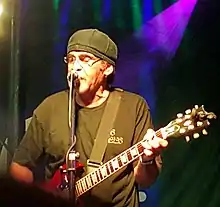Johnny Echols
John Marshall Echols (/ɛ́kəlz/, born February 21, 1947) is an American songwriter and guitarist, who was a co-founder and the lead guitar player of the psychedelic rock band Love.
Johnny Echols | |
|---|---|
 Echols onstage with The Love Band, July 2019, Bristol, England | |
| Background information | |
| Birth name | John Marshall Echols |
| Born | February 21, 1947 Memphis, Tennessee, United States |
| Origin | Los Angeles, California, United States |
| Genres | Rock |
| Occupation(s) | Musician |
| Instrument(s) | Guitar |
| Years active | 1960s-present |
Early life and career
Johnny Echols was born in Memphis, Tennessee. He moved with his family to Los Angeles, California, in the late 1950s, and re-established a childhood friendship with Arthur Lee, who had also moved to the city from Memphis a few years earlier; their respective families were friends. Echols began playing guitar as a child, and in his teens played in bands with Billy Preston, Marilyn McCoo, Clarence McDonald and others.[1][2] Echols and Lee both attended Dorsey High School, and decided to form a band. The band became "Arthur Lee and the L.A.G.'s" (an allusion to Booker T. and the M.G.'s) before splitting up. Lee and Echols then formed The American Four, later re-named The Grass Roots, and finally re-named Love in 1965.[3] Echols also worked as a studio musician alongside Glen Campbell and others.[1]
Career with Love
Echols contributed as lead guitarist and writer to Love's first three albums: Love, on which he is credited as co-writer of three songs; Da Capo, credited as co-writer of the side-long improvised track "Revelation" and Forever Changes, often cited as one of the greatest rock albums of its time.[4] Forever Changes comprised songs written by Lee and by fellow band member Bryan MacLean. The record company, Elektra Records, would only release a single rather than a double album, and songs written by Echols for a possible companion album, tentatively titled Gethsemane, were never recorded by the band.[1][5] In 1968, the band split up: they were performing less frequently; sales of Forever Changes were disappointing; there were personal disagreements among the band members; MacLean was considering a solo contract with Elektra; and most of the band members, including Echols and his housemate, bassist Ken Forssi, had become heroin users. However, rumors that Echols and Forssi robbed donut shops to support their habit are unfounded.[6]
Later activities
Echols moved to New York City, where he gave up drugs, worked as a studio musician with Miles Davis and others,[7] and taught guitar. He moved to Arizona in the 1980s.[8] Occasional attempts by Lee and others to reconstitute Love did not bear fruit until 2003, when Echols joined Lee and his backing band, Baby Lemonade, onstage in Los Angeles.[1][9] Echols toured with the band in 2004 and 2005, though the 2005 European tour was without Arthur, who cancelled at the last minute due, they were to find out later, to the cancer that he died from.[1] After Lee's death in 2006, Echols continued to perform with Baby Lemonade, billed as "Love Revisited" (2016) or "The Love Band featuring Johnny Echols" (2019).[10]
References
- "Love Story", Record Collector, 2016. Retrieved 5 July 2019
- Gary James, Interview with Johnny Echols of Love, ClassicBands.com. Retrieved 5 July 2019
- John Einarson, Forever Changes: Arthur Lee and the Book of Love, ISBN 978-1-906002-31-2, 2010, pp.40-50
- Mark Deming, "Review: Forever Changes", Allmusic.com. Retrieved 5 July 2019
- Eoghan Lyng, "A Piece of Love: An Interview with Johnny Echols", CultureSonar, January 21, 2019. Retrieved 5 July 2019
- Einarson, pp.202-204
- "From Liverpool With Love", BidoLito.co.uk, July 2016. Retrieved 5 July 2019
- Einarson, p.208
- Einarson, p.303
- Simon Godley, "Farewell UK Tour from The Love Band featuring Johnny Echols", God Is In The TV, December 11, 2018. Retrieved 5 July 2019